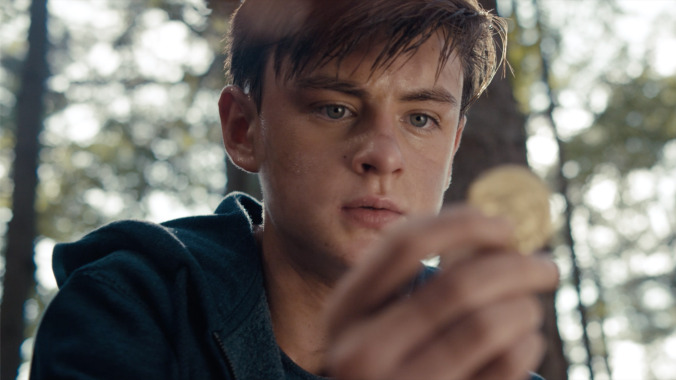Amblin Entertainment movies of the 1980s have become such a frequent touchstone for early-career filmmakers that Low Tide recalls them without even really trying. Just listen: It’s a retro summertime story about a group of young friends who discover what amounts to buried treasure. But the debut feature from writer-director Kevin McMullin manages to use that insta-nostalgia as a jumping-off point, not a mission statement. The Spielbergian flashlight beams don’t belong to kids discovering aliens or going on an adventure, but teenagers rifling around the summer homes of tourists, looking for stuff to steal on the New Jersey shore. At very least, McMullin seems like he might hold Springsteen in higher esteem than The Goonies.
Alan (Keean Johnson) is the group’s de facto ringleader, and also the one who seems like he should know better. But he, Red (Alex Neustaedter), and Smitty (Daniel Zolghadri) have a system: They only hit the houses of rich visitors, not the homes of other townies like themselves. Alan and Smitty need the money, with one mostly-absent parent between the two of them. Red’s appetite for violence, meanwhile, suggests that he may be into the B&E scene for spite, or to court danger. Despite their differing styles, the boys agree to bend their no-locals rule when they hear about the death of a peninsula-dwelling recluse, rumored to hold substantial wealth without an immediate heir. Because Smitty has been injured in the line of duty, Alan recruits his straight-and-narrow younger brother, Peter (Jaeden Martell, from the It movies), to serve as their lookout.
Alan doesn’t come across as smart, exactly, but he and the movie are both quietly clever about how he manipulates his brother by initiating him into masculine rituals: cruising the boardwalk, sipping beer, hanging out with girls and, eventually, nighttime robbery. As it happens, Peter’s first robbery is high-yield, as the brothers discover a cache of gold coins that might change their lives—if they can evade the police and/or their own supposed friends. There are some additional bits of subplot, but Low Tide is made with such economy and skill that to further describe its modest but satisfying plot turns would belabor them in a way that the movie itself rarely does.
McMullin is one of those scrappy discoveries who shows an immediate command of film grammar. His cuts in the robbery sequences are sharp and intuitive, capturing key images and imparting key information without lingering. Later, he depicts a sliver of Red’s backstory in flashback composed of just half a dozen still photos, which are as evocative as they probably were money-saving. Low Tide moves quickly and confidently enough to outrun the sense that McMullin hasn’t fully reconciled its dual points of view. His movie doesn’t express any novel ideas about how youthful hope turns into realistic adult-world disappointment—or, for that matter, vice versa. (Favoring Peter’s more innocent point of view, it detours into Alan’s world mostly for the benefit of a sweet but underdeveloped romance between the older boy and a tourist he meets on the boardwalk.) Still, it’s neat to see a movie mix adventure with harder-edged noir (there’s even a dash of police-informant drama), mirroring the characters’ half-grown sensibilities.
Low Tide doesn’t express much sentimentality for its Jersey Shore setting, yet it’s still a pleasure to spend some time in it. Part of the film’s spell is how it never specifies an exact year. It’s probably the ’80s, and definitely sometime after the advent of Bon Jovi, but none of the characters make reference to their own time period, and the old-timey TVs mostly play public-domain cartoons and old game shows. (Price Is Right fanatics might be able to pinpoint the year with greater accuracy.) It’s grounded enough to feel real, but enough of a movie universe that the only adult authority figure is perpetually vexed character actor Shea Whigham, playing a cop wise to the boys’ individual strengths and weaknesses. His emotional dimension, like Mary’s, is limited. Low Tide is mostly a genre exercise. But it’s a disciplined, rigorously entertaining one.



 Keep scrolling for more great stories from The A.V. Club.
Keep scrolling for more great stories from The A.V. Club.